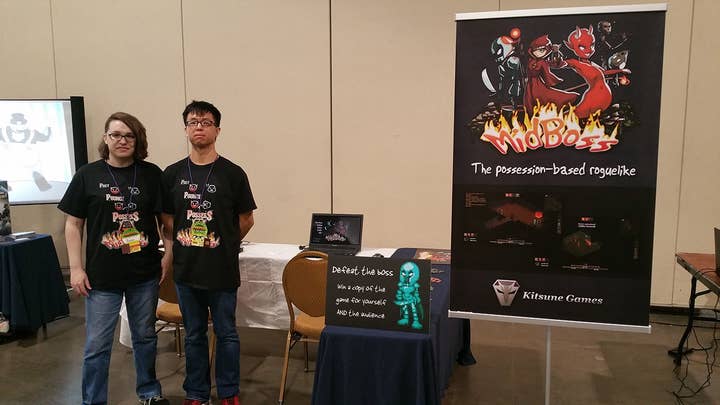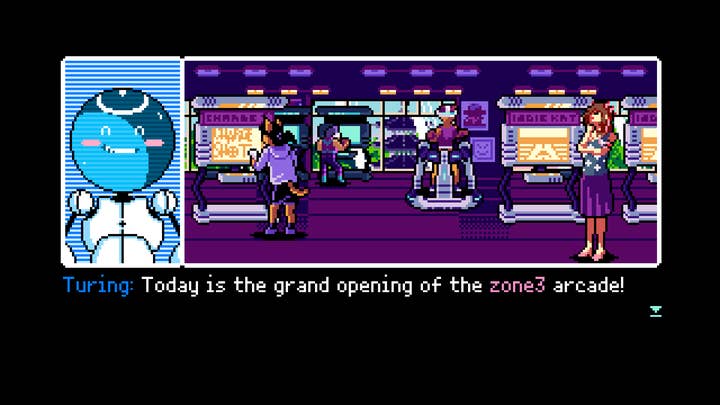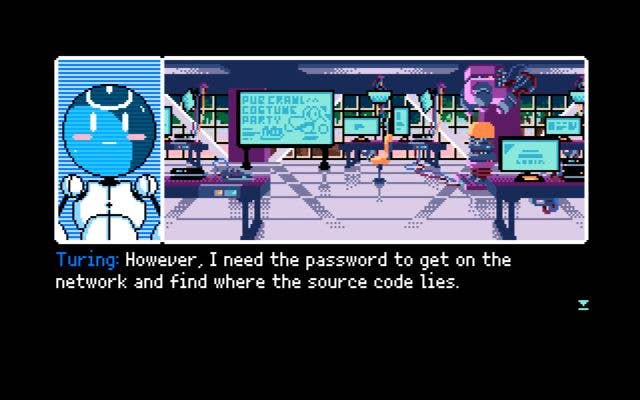A tale of two MidBosses
MidBoss' Cade Peterson and Kitsune Games' Emma Maassen discuss collaborating to improve LGBTQIA+ representation in the industry
Cade Peterson and Emma 'Eniko' Maassen have a lot in common. They're both heads of indie game studios. They both care deeply about bettering representation of LGBTQIA+ individuals in video games.
And they both share a trademark on the name "MidBoss," despite their companies being completely separate. It's thanks to that trademark, and the conversation it started, that the two companies are now collaborating on an unannounced project.
Peterson is the CEO of production company MidBoss, which specifically makes inclusive media targeting sexual minorities and people of color. The company was started in 2012 and is responsible for indie darling 2064: Read Only Memories.
"Every time you make another piece of the franchise, you have a built-in audience for it. Why not build our own audience and roll that snowball down the hill?"
Cade Peterson
When Peterson joined MidBoss in 2018, there were only two items in the company's portfolio: 2064, and the documentary Gaming in Color. But that meant that MidBoss was already a multimedia studio, so Peterson had a clear path to expanding that capacity.
As interim CEO, Peterson began working to carry the business into comics and other media -- a process that happened faster than expected thanks to audience love for 2064, which Peterson attributes in part to its inclusivity of different genders and sexual orientations.
"Every time you make another piece of the franchise, you have a built-in audience for it," they say. "So why not? Why not build our own audience and roll that snowball down the hill till it gets bigger and bigger and bigger?"
Maassen, meanwhile, is head of Kitsune Games, a studio of about two dozen that's responsible for, among other titles, a game about a player that can possess the bodies of defeated enemies to grow their power. The game's title? Also MidBoss.

"Our mission is to make traditional games accessible and diverse," she says. "What that means is that we do like to make, you know, gamey games, whatever that means. Core games. But we like to make them with an eye on diversity for marginalized people, but also try and make them as accessible as we can for people who may have physical disabilities of some kind."
Alongside MidBoss, Kitsune also put together Super Mario Bros-inspired platformer Super Bernie World earlier this year over the course of two weeks, with just a handful of people working on it. In it, players control Vermont senator Bernie Sanders -- who, at the time of release, was still in the United States presidential race -- as he attempts to "free the USA from the clutches of four Republicans in their castle lairs." The studio is also currently working on 2D Metroidvania title Lorefinder, described as "a queer reimagining of the cosmic horror genre."
"Our mission is to make traditional games accessible and diverse. We do like to make core games. But we like to make them with an eye on diversity"
Emma Maassen
So where do MidBoss and MidBoss studio Kitsune Games sync up? It began, initially, with the MidBoss trademark. With Peterson's takeover as interim CEO of MidBoss in 2018, they began working aggressively to ensure everything in the company was properly documented, which hadn't previously been the case. They trademarked 2064: Read Only Memories, the game's lovable robot character Turing, and attempted to trademark the company name only to find it had already been taken by Kitsune Games.
Fortunately, a conversation with Maassen cleared matters right up. MidBoss paid Kitsune "a few thousand dollars," and MidBoss was given permission to trademark the word as a company name while Kitsune maintained it for use as a game name. That's how the discussion started, but now the two are collaborating on an unannounced project that came about as a result of subsequent discussions about the compatible skillsets of the two teams.
"Also, it became something more than that, because we quickly realized that we both run queer studios," Maassen adds. "And we both want the best for queer representation and games and queer games, especially made by queer people and queer developers. And we realize that it's hard being queer in the games industry. A lot of queer developers and queer businesses, they don't have the connections and the resources to really get taken seriously.

"It's been a long struggle for Kitsune Games. Seven years we've been doing this now, and we're finally getting on top. And we realized that if we bundle our strengths, then we can both be stronger for it individually and together. We can really push the envelope on queer games, and queer representation. And if things go well, then we can also help other queer developers, whether they're studios looking for connections, or publishing or jobs.
"That's all future stuff. I'm not saying that we're getting into any of that. That is the vision: that we can be at the vanguard of really mainstreaming queer games and queer game studios and queer devs, and making it better for everyone in our community."
"We see that AAAs are dipping their toe in the water. But often they do it in a way where the people that they're trying to tell stories about are not involved"
Emma Maassen
Details on the partnership are currently under wraps. The two can only say for now that they're collaborating on a project, and that it somehow ties into their shared interest in making more games with a queer focus. Both say that while the industry has been improving in visible representation over the years, there's still a lot of work to be done.
"I think the biggest barrier is probably access for queer devs," Maassen says. "Because we see that AAAs are dipping their toe in the water a little bit. And that's great; that's really good. But often they do it in a way where the people that they're trying to tell stories about are not involved, and that's just because they don't get access.
"If you don't give the voices that those stories belong to access to the games industry so that they can participate in creating representation, then representation is going to keep being held back."
Peterson adds: "The bigger AAAs, they're starting to do a little bit more inclusion and not just like a single token queer character on the side. Like, 'We got one gay,' or worse, what I call villainism, where there's the big bad guy or bad person is the one queer person. So they're making less of those mistakes."
Peterson points to Dontnod Entertainment's Tell Me Why as an example of a recent, bigger release that's put queer representation at its center.
"The fact that that's happening is amazing, but it's still just a drop in the bucket," they continue. "And if we have to lead the charge and show the rest of the game industry how to do it well...we're gonna keep doing it."
"The bigger AAAs, they're starting to do a little bit more inclusion and not just like a single token queer character on the side"
Cade Peterson
While this mission is clearly important, MidBoss has had its share of struggles. Company founder and former CEO Matt Conn was accused in 2018 of exploitive practices and sexual harassment, with multiple employees describing the toxic behavior and harmful work environment -- especially for women and people of color -- that was created as a result.
In the following months, Conn was removed, and Peterson brought in from outside initially as interim CEO -- a position they thought would only be for six to 12 months, but are still holding over two years later.
Peterson acknowledges the company's struggles, and how harassment disproportionately impacts marginalized individuals across the industry. They outline that, in the immediate aftermath, steps were taken to ensure such actions never happen again -- including one-on-one meetings with everyone at the company to get a clear picture of what happened, sexual harassment training for everyone at the company including themselves, implementing proper HR, putting all agreements in writing, instituting reporting methods, and stabilizing the company's finances.
"Everybody that still works for the company got raises," they say. "So that was good. Because once I got the cash flow done, we've been digging out of debt while we've been working on the new game, so it's been a longer haul situation than I thought. But it's been really satisfying.
"And the team is so much happier. I do anonymous check-ins with them every three or so months to see like, 'Are you excited to wake up and work on this every day? Do you feel like we're taking this company in a good direction?' And it's always 'Yes, awesome. I'm happy to be here.' Because before that, it was always just kind of stressful. And I'd get texts or emails in the middle of the night to like, jump up and do something. That's not okay. So, I had to do it from the inside out, otherwise it's just going to end up in a bad place again."
In a follow-up email, Peterson confirmed that Conn does still hold a stake in the company, though it's been reduced in the last two years from an initial 80% to 40% once Peterson took over, and again down to approximately 30% now. The recent reduction in Conn's shares was distributed between Peterson, JJ Signal, and Sergio Kossio.
"Invest in queer stories so that these little studios that have queer employees that want to make queer games get a chance to do it"
Cade Peterson
Maassen adds: "Obviously, we're aware of what happened; it's a small community. And I have to say, we wouldn't be doing this partnership with MidBoss if we didn't believe in the changes that Cade has made, and we didn't believe that they have overcome the problems that were there. You can see it in stuff like the Summer of Pride.
"MidBoss just really wants to help other queer people and core devs and queer games. And Summer of Pride has been an amazing help to us this year, because with coronavirus, some things have gotten a little bit out of whack market-wise with a little less people buying games because they're short on cash."
Both Peterson and Maassen say they intend to continue doing as much as they can to improve conditions in the industry for LGBTQIA+ individuals and marginalized individuals more broadly, in addition to representation in the games they make. But both also want the industry as a whole to do better at supporting queer individuals, especially in the upper echelons.
"For the longest time, I feel like we didn't really get taken very seriously," Maassen says. "We weren't really given the benefit of the doubt that other studios get. And I think: give people a shot, give studios a shot, and you'll be surprised what they will do. And give them the benefit of the doubt."
Peterson concludes: "To publishers or people that invest in games, I would say be open-minded to things like queer stories and games, because they can win awards. They can have an audience that's not just the queer audience, but broad-spectrum, and I think that people would be surprised at how broad an audience -- you can make queer games that people love across the board. I would even venture to say that more than half of 2064 fans are not queer in any way. But we get fan art and tweets at us all the time from people all over the world.
"Invest in queer stories so that these little studios that have queer employees that want to make queer games get a chance to do it. It's a two-part thing: Hire queer, and fund it too."


